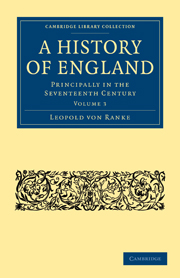Book contents
- Frontmatter
- Contents
- BOOK XI THE COMMONWEALTH IN ENGLAND, 1649—1653
- BOOK XII THE PROTECTORATE OF OLIVER CROMWELL, 1653–1658
- CHAP. I Oliver Cromwell and his elevation to the Protectorate
- CHAP. II Embassy to Sweden. Peace with Holland
- CHAP. III The Parliament of 1654
- CHAP. IV Military government. Religious tolerance
- CHAP. V Rupture with Spain
- CHAP. VI The Parliament of 1656, 1657. Idea of a Cromwellian Monarchy
- CHAP. VII The general position of the Protectorate at home and abroad in 1657 and 1658
- CHAP. VIII Death of Oliver Cromwell
- BOOK XIII FALL OF THE PROTECTORATE AND THE COMMONWEALTH. RESTORATION OF THE MONARCHY, 1658—1660
- BOOK XIV THE FIRST FIVE YEARS UNDER CHARLES II. THE RESTORATION OF THE ANGLICAN CHURCH
- BOOK XV THE DUTCH WARS OF CHARLES II. ESTABLISHMENT OF THE PROTESTANT AND PARLIAMENTARY CHARACTER OF THE CONSTITUTION 1664—1674
CHAP. V - Rupture with Spain
Published online by Cambridge University Press: 07 June 2011
- Frontmatter
- Contents
- BOOK XI THE COMMONWEALTH IN ENGLAND, 1649—1653
- BOOK XII THE PROTECTORATE OF OLIVER CROMWELL, 1653–1658
- CHAP. I Oliver Cromwell and his elevation to the Protectorate
- CHAP. II Embassy to Sweden. Peace with Holland
- CHAP. III The Parliament of 1654
- CHAP. IV Military government. Religious tolerance
- CHAP. V Rupture with Spain
- CHAP. VI The Parliament of 1656, 1657. Idea of a Cromwellian Monarchy
- CHAP. VII The general position of the Protectorate at home and abroad in 1657 and 1658
- CHAP. VIII Death of Oliver Cromwell
- BOOK XIII FALL OF THE PROTECTORATE AND THE COMMONWEALTH. RESTORATION OF THE MONARCHY, 1658—1660
- BOOK XIV THE FIRST FIVE YEARS UNDER CHARLES II. THE RESTORATION OF THE ANGLICAN CHURCH
- BOOK XV THE DUTCH WARS OF CHARLES II. ESTABLISHMENT OF THE PROTESTANT AND PARLIAMENTARY CHARACTER OF THE CONSTITUTION 1664—1674
Summary
Protestantism was supreme at home, and abroad it was decisive in questions of peace and war.
The leaders of the Long Parliament, who encouraged the friendly relations with Spain, and carried on the war against Holland with the utmost energy, had already by so doing given offence to the Protestant Churches. A common danger to the Protestant creed seemed to be imminent when the two most powerful states which adhered to it, the two Protestant Republics, were plunged in war, and were weakening each other.
Peace was as much for the interests of the Protector as for those of England. It gratified the Protestant sympathies of the nation. The English Presbyterians joyfully welcomed it. It was under the influence of these sentiments that the Swedish negotiations had been entered upon and the peace with Denmark concluded.
The example of Germany showed how injurious to the common cause of Protestantism were the feuds of the various denominations, and the English government in consequence gave renewed support and attention to the efforts of the great apostle of Protestant union, John Dury. He was attached to the embassy which was now sent to Switzerland, and which had in view also the relations with Germany and the learned there, especially George Calixtus at Helmstadt.
- Type
- Chapter
- Information
- A History of EnglandPrincipally in the Seventeenth Century, pp. 154 - 165Publisher: Cambridge University PressPrint publication year: 2010First published in: 1875

